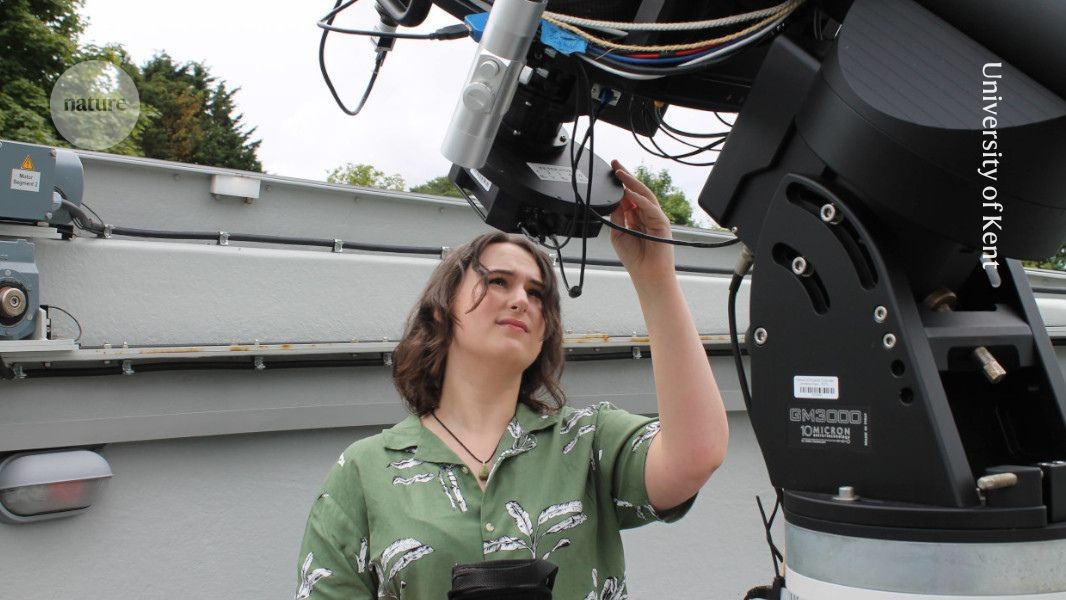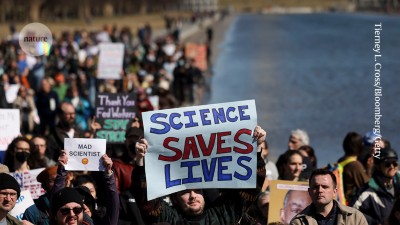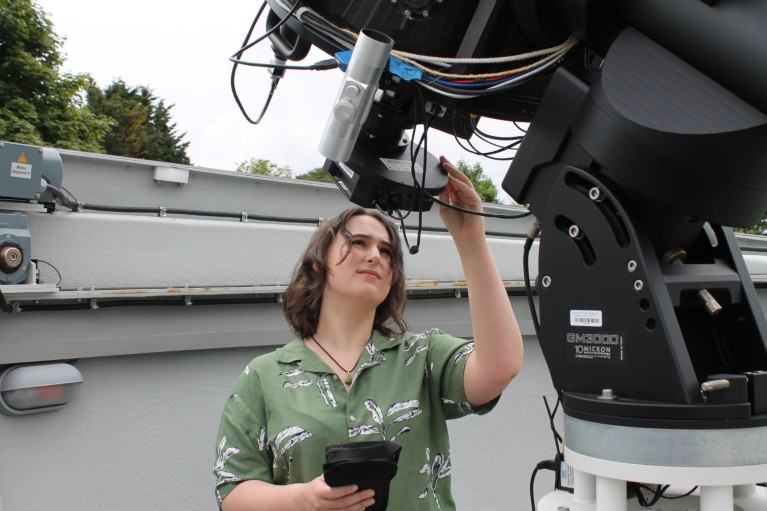
Carys Herbert inspects a telescope used in citizen-science projects at the University of Kent’s Beacon Observatory in Canterbury, UK — while she also scans the horizon for a permanent position after her PhD. Credit: University of Kent
The global PhD class of 2025 is entering the workforce at a tumultuous moment. In many ways, the world continues to course-correct from disruptions caused by the COVID-19 pandemic, and students in the United States and beyond are weathering the deep cuts to science and international collaborations by the administration of US President Donald Trump. Others are left wondering whether a research career is still worth pursuing, particularly in places facing economic crises or being torn apart by war, such as Sudan, Ukraine and Gaza.
US government funding for scientific research is currently approaching a 25-year low, even though global investment in research and development has tripled over the past three decades. But investment in science and technology hasn’t necessarily led to more jobs, meaning that scientists attempting to launch their careers today continue to face shortages in faculty positions in academia alongside a shrinking industry job market.
Nature’s careers team spoke to five early-career researchers who began their PhDs during the early days of the COVID-19 pandemic and are now planning their next steps. One requested anonymity, fearful of repercussions from speaking out. Whereas some are hopeful about their futures, others share how the challenges of the past few years have disrupted their plans or realigned their priorities.
CARYS HERBERT: Disillusioned by academia, facing a bleak job market
Defended her PhD in astrophysics from the University of Kent in Canterbury, UK, in December 2024.
I started my PhD in September 2020, and despite the difficult conditions during the COVID-19 pandemic, I was actually very fortunate. I had applied to PhD programmes outside Kent after completing my master’s degree there, but ended up staying with my supervisor. I made that choice before the lockdowns happened, but it was an absolute blessing in disguise to have stayed in a place I knew. For my PhD, I characterized the surface spots on young stars using citizen-science data through a programme called the Hunting Outbursting Young Stars project. To really study how stars form, you need to look at day-to-day changes in these surface spots, which you could never get a professional observation facility to do because of the time and cost involved. Instead, I used data from citizen scientists who submit observations to a database using personal telescopes and cameras. Looking back on my PhD, I think that citizen science has the power to be important and effective in these uncertain and under-funded times.
I’ve been out of the academic world for about eight months now, and I’m a bit disillusioned because it feels like you can do everything right and still end up without a permanent position. Because of that, doing a postdoc hasn’t been my first option, but the job market feels so bleak that I’ve reconsidered.
There are a lot of things I like about the United States, but I wouldn’t touch a postdoc position there with a barge pole. I am a queer woman of child-bearing age who wants to have kids one day and, in my opinion, it’s not great to be any of those things in the United States right now. I also have some chronic health conditions, and I don’t want to have to navigate them in the US health-care system. Unfortunately, things feel only a little bit better in the United Kingdom because it seems like funding for UK research projects is scarce too.
When I think about parts of my career that still bring me joy, I think about my professional community. I’ve really enjoyed doing outreach and being in a university setting. I value that kind of devotion to learning and research. Ever since the COVID-19 pandemic, I’ve been mindful of connecting intentionally with colleagues. Maybe I don’t see these people every day, because we’re an international community, but I do try to appreciate those bonds and keep in touch. I think that’s become important to all of us.
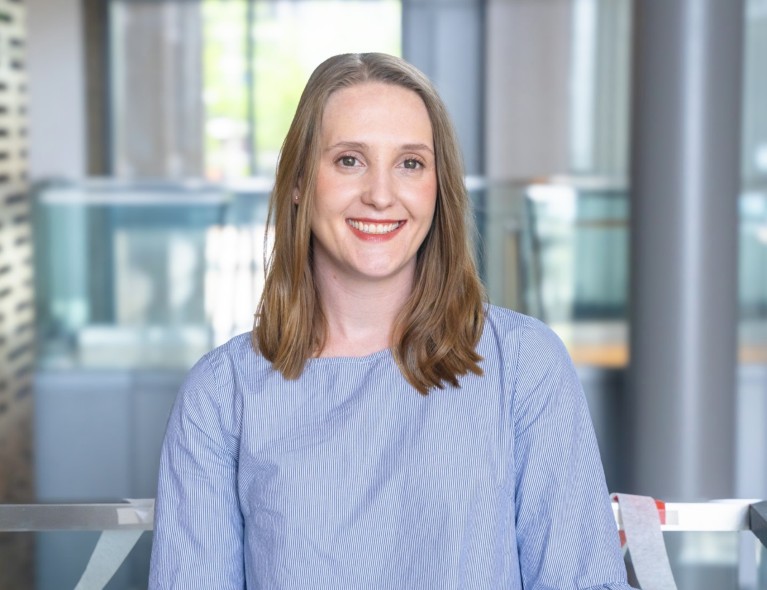
Rachel Gatlin’s postdoc position hangs in limbo amid a US federal hiring freeze. Credit: University of Utah
RACHEL GATLIN: A clear path for the future, now frozen
Earnt her neuroscience PhD from the University of Utah in Salt Lake City in February.
I started my PhD in 2019 in a brand-new laboratory, and it was like the Wild West. We didn’t even have pipettes when I started, and my principal investigator went on maternity leave soon after. But the past six years of my life have revolved around using mice to study what happens in our brains when we’re isolated physically and socially from each other, which ended up being topical during the pandemic. Even so, I sometimes feel like I’m playing catch-up. The pandemic made me work creatively and forced me to be independent early on, but it also created challenges. When I started looking for jobs at the end of last year, it was tricky to navigate the dual disruptions of the pandemic and being one of the first students to graduate from my lab, both of which reduced the number of projects I’ve been able to jump on during my PhD.
I accepted a postdoc position through the University of Washington in Seattle and housed at the Veterans Affairs hospital there in November. Then, in February, I had a video meeting with the two PIs who I’d be splitting my time with, and they told me there’d been a federal hiring freeze (now extended until October). Right now, my postdoc position is in limbo, and it’s hard not to feel that if I’d defended my PhD even two weeks earlier, I could have avoided this. When the freeze happened, the policy was that if you had already started paperwork for recruiting, you were allowed to continue.
#OpenToWork: how laid-off US scientists are coping with shattered careers
It’s difficult to plan around all the chaos, and I’m struggling to decide whether I should leave Utah to move to Washington — which is more expensive, but where my family is — or stay until things get sorted. I applied for a US National Research Service Award that funds postdoctoral research. If I get it, the award stipulates that I have to start spending it right away, so it might prompt some movement on beginning my postdoc.
Another complication is that I’m switching fields — from looking at social and emotional behaviours in mice, to studying circuits in neurodegeneration in the nematode worm Caenorhabditis elegans — a model organism that I lack experience with. I applied for the postdoc grant over a marathon four days and just about fell over afterwards. Thank goodness for my cat, Yoshi, who is really bearing the responsibility of boosting my mental health.
If this grant doesn’t come through, it’s hard to know what I’ll do. I’ve always heard that academia is the more stable career path, and part of me went looking for a postdoc position thinking that I could ride the uncertainty out, but it doesn’t feel like that’s the case any more. No matter which path I take, I think I would have encountered instability. My hope is that if I can get this position settled, the next five years will help me to work out the next steps.
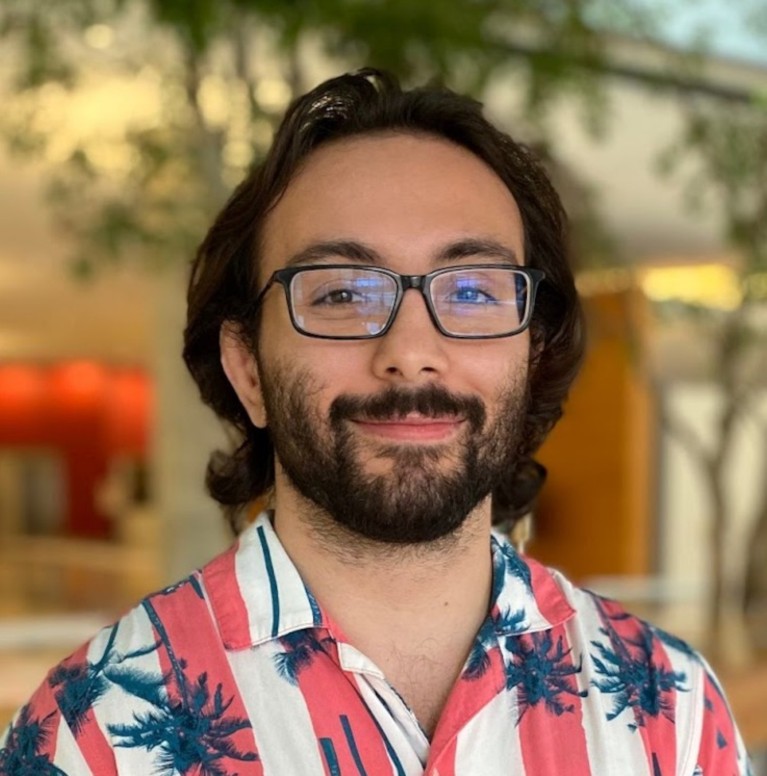
David Rivera-Kohr faces a shrinking pool of sustainability-research jobs in the United States.Credit: David Rivera-Kohr
DAVID RIVERA-KOHR: Seeking opportunities in sustainable biotechnology
Will defend his biochemistry PhD at the University of Wisconsin–Madison later this year.
I started my programme in August 2020, so COVID-19 restrictions made it interesting from the start. My cohort wanted to connect, but it was difficult because of social distancing, and it took me a long time to get my bearings in a new city (I’d moved from Illinois). Fortunately, I was still able to do two out of three lab rotations in person during my first year, and by the time I picked my lab in 2021, we were back to doing full-time research in person.
The bigger upset has been the uncertainty around US politics. I knew Trump was going to start his second term with more of a plan, but I didn’t anticipate what would happen. Things are a mess, and it feels like a lot of unnecessary changes have been made to hinder science. It takes a toll mentally, but it also makes my principal investigator and lab group more conservative about our spending. We don’t know how long the money is going to last or whether new funding will come in, so we’re trying to cut costs. I’ve had to check with my supervisor about every little thing that I buy.
My thesis research is developing methods for sorting out and breaking down plastics in the municipal waste stream. I want to continue working in sustainable biotechnology, and there are three options for that: academia, government and industry. Academia is supposed to be the safe option, but there is little to no upward mobility and I’m not very interested in doing an academic postdoc. Government was a strong contender, but the US administration is cutting funding for government research and seems to be openly against sustainability, from what I’ve seen. Even if policies get walked back, many government researchers have already been laid off or resigned, and the public’s trust has been lost. And then we get to industry. For years I’ve heard people say ‘biotechnology is in a slump, but maybe by the time you graduate, things will be better’. Now I’m about to graduate, and it seems worse than it was before I started.
So, on all three fronts, US job prospects are not great, and I don’t want to compromise on the type of research I want to do. I will probably start looking for opportunities abroad. It’s an internal conflict, however. Do I owe it to my community and country to stay and fight for a better world, or is leaving justified if it means living to fight another day? I don’t want to sound too alarmist, but it does often feel as if people’s livelihoods are on the line. It makes it hard to plan for the future.
ANONYMOUS: Seeking a path to the United States
A fifth-year PhD student at a university in Israel is seeking a postdoc opportunity abroad. They requested anonymity out of concern for their family’s safety and future job prospects.
I wrote my master’s thesis from a tiny, enclosed balcony in 2020 during lockdown. I stayed in the same lab for my PhD, but the uncertainty at that time didn’t help with my motivation or planning my research for the next few years. I work with human data, and data collection was halted or intermittent for my first year, starting in late 2020 and into 2021. At the same time, Israel was in another period of intense anti-government protests because of criminal charges against our Prime Minister, Benjamin Netanyahu. My partner and I went to a few protests, but everything around it was scary — the police response, coronavirus and, above all, the uncertainty of whether the political climate would be one that I could stay in for the length of my PhD.


